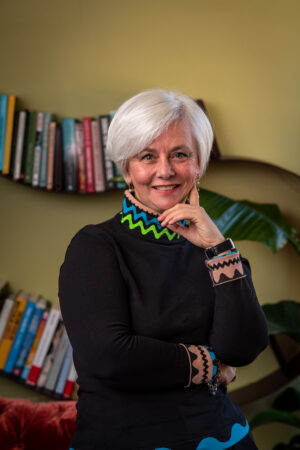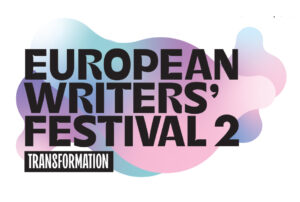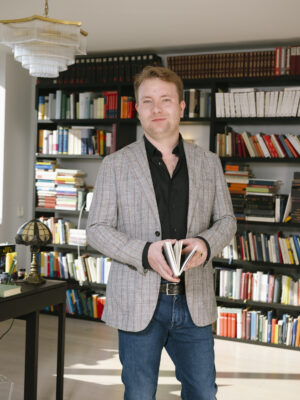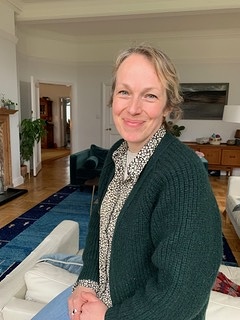New Books in German met for a chat with CEATL President Shaun Whiteside at the London Book Fair
The Conseil Européen des Associations de Traducteurs Littéraires (CEATL) is the European Council of Literary Translators’ Associations. CEATL works hard to improve literary translators’ status and working conditions and currently has 35 member associations from 29 countries across Europe. It has been lobbying to ensure that reforms relating to authors also apply to literary translators in the new European Copyright Directive. CEATL has recently published Translators on the cover – Multilingualism & translation and issues regular reports on working conditions for literary translators.
Helen Nurse: CEATL has been lobbying to improve European copyright conditions for literary translators. How has that been going?
Shaun Whiteside: We are campaigning on this one. The EU DSM Copyright Directive is designed to protect the rights of authors and translators as well as publishers within the digital market, but the balance isn’t always being interpreted that way by individual countries. As things stand, we have sent letters to various governments. For example, we sent letters to the Austrians as they were edging much more in favour of the publisher in their interpretation of the European Copyright Directive, favouring copyright protection for the publisher over that granted to the translator. We are seeing this all over the place, in Italy as well. And this is one of those areas where CEATL can achieve something through concerted work, concerted research and through solidarity, I think. Sad to say the UK, having left the EU, is uninvolved in the process.
Helen: Why do some countries tend to give the publishers more support, do they feel that the balance is shifting too much towards the translator or what could be the reasoning behind these decisions?
Shaun: I don’t think it’s that. I think it’s quite simply that the publishers have access to greater funds, they hold most of the cards in these things, and it’s an instance where we have to make a stand on our behalf. Some individual European literary translators’ associations are stronger than others, and some of them are pretty new, so they haven’t got the momentum behind them yet. So that’s where the Council comes in useful in that we are all standing shoulder to shoulder and a letter or representation from CEATL may make a difference.
Helen: I know that a lot of work has been done to try and make naming translators on book covers and giving translators a share in royalties become industry standard. How close are we to this becoming a reality?
Shaun: What’s interesting here is that the ‘name on the cover’ issue, reported in Counterpoint (Authors and Translators United, Counterpoint, No. 6, 2021) in the piece by Jenny Croft and Mark Haddon, came from the Anglophone writers and translators, particularly from Mark Haddon, saying that he wanted his translations in Europe to have the European translator on the front cover. There has been something of … not a backlash exactly … but more of a question regarding whether, a little bit like applauding the NHS, it’s one of those things that doesn’t actually cost anybody anything. It looks great, but it has to be part of a package, which involves proper remuneration, proper royalties, copyright, which we still don’t always get, and which we should always get because we are authors in our own right, which is something that CEATL stresses.
Helen: I don’t have copyright for any of the book translations that I did when I was younger. It didn’t even occur for me to ask. I just assumed that I was getting paid for the work and that was the job done. I am so glad CEATL and other organisations are supporting translators in this regard.
Shaun: I don’t have copyright for all of my translations either. But I was actually quite lucky. I managed to dig out one of my earliest contracts because the publisher closed down and another publisher, two other publishers in fact, wanted to publish this particular book, which had been continuously in print since 1992. Luckily I found the contract and I did have copyright (although there was no guarantee that I would have had it at the time) and signed it up, and now Marlen Haushofer’s The Wall, is due to be published by New Directions in the States and by Vintage here in the UK. So yes, it’s very important for translators to have copyright, even if not all publishers have caught up with the idea.
Helen: Regarding younger translators, I can absolutely see why publishers might be happy to have high profile translators like Jennifer Croft and Anton Hur on the cover of their works as this attracts readers and is a selling point. But do you think emerging translators might feel they just have to take what they can get and will therefore not lobby hard for recognition at such an early point in their careers?
Shaun: This is part of the problem of being a translator. You’re not necessarily the kind of personality that wants the limelight all the time. And maybe that’s why, speaking personally to some extent, you got into translation rather than something else in the first place. However, on behalf of all other translators, I think it’s probably one of those things that you have to take on board. You have to say, I’m not just doing this for me, I’m doing it for my colleagues as well.
Helen: Have you come up against objections from publishers as to why they won’t put names on the cover. What’s the general feeling?
Shaun: Some of them have been quite good. The smaller, newer, younger publishers are very good. The more established ones seem to be more reluctant, and they make claims along the lines that it will spoil the design of the cover, for example. Some new publishers, Prototype is one of them, V&Q Books is another, are putting the translator’s name on the spine, which is brilliant. But I think there is a spirit of solidarity between these smaller, younger, more independent publishers and translators. But some of the bigger publishers I work for are very reluctant, even when I think it would actually be a sales point, because people in the industry now know the names of translators and I’m convinced that they buy books on the strength of those names.
Helen: In the case of some high-profile translators, putting the name on the cover can be a marketing tool and it seems like some publishers are missing a trick there.
Shaun: That’s exactly what I think. Frank Wynne, I’m sure he won’t mind me saying this, booked a taxi a few weeks ago and the driver asked, “Are you Frank the translator?” and he said he was and so they talked about books and translation for the whole journey. We translators as a group are much more prominent now than we were when I started 30 something years ago.
Helen: Definitely, even 20 years ago. I think the British Centre for Literary Translation has done an awful lot to raise the profile and so has the Society of Author’s Translators Association.
Shaun: I think the Translators Association has undergone a transformation over the last 20 years or so, I suppose. And it is one of the youngest. Because the members used to be … I’d say they’ve been around for a while by and large … and I can remember when Christmas drinks were suggested but called off for lack of interest and that is something that definitely wouldn’t happen now.
Helen: No, it’s such a lovely group of professionals. They’re very supportive to one another, aren’t they?
Shaun: Yeah, very much so. They are cooperative and collaborative and pass on ideas and work sometimes too. And I think they’re particularly good at the moment in terms of encouraging diversity. And because it hasn’t always necessarily been the most diverse group of professionals and that’s something that’s improved greatly over the last little while now.
Helen: Part of the problem with that is the fact that it’s quite a precarious way to make a living until you’ve established yourself.
Shaun: Until you’ve established yourself, you do need other strings to your bow. And in the past we have traditionally had what is sometimes called portfolio careers. In other words, we weren’t necessarily sure what we were at, so we did a bunch of different things, as I did. But making sure that you have those strings to your bow so that if there is a desert, if there is a dearth, you actually have something to fall back on, whether it’s teaching or bookselling or publishing, or journalism, for example, because it’s usually going to be something along those lines.
Helen: But that’s the nature of freelance work, isn’t it? It either all comes together, so you have three or four projects on the go, and it feels overwhelming. Or you have several months where you wonder whether you are ever going to work again.
Shaun: Yes, indeed. Yes, and that’s when you take on the three projects at the same time, which you shouldn’t because you’re not going to do any of them quite well enough.
Helen: Yes, that sounds very familiar! I was listening to the Front Row programme with Frank Wynne and Jennifer Croft, and it had not occurred to me that being granted copyright was such a hard thing a) to have written into contracts and b) to have it actually delivered once it is in the contract. And I think you have mentioned in the past that royalties can sometimes be a bit of a symbolic gesture.
Shaun: Yes, however, even if it is symbolic, it indicates a certain respect on part of the publisher, that they are respecting your input. It’s very important, even though the royalties are sometimes notional, because you’re not necessarily going to earn out, you do still feel that you have an investment in the project, and I think that that’s better for all concerned.
Helen: Yes, but also that the publisher sees that you have an investment in the project as well. Like you said, it’s an according of respect.
Shaun: Well, it’s in their interest to invest in you, surely it must be.
Helen: Indeed, and also in terms of a longer-term working relationship as well.
Shaun: Ideally what you want, of course, is a royalty from the first copy sold.
Helen: Is that not standard?
Shaun: Some publishers do that. It’s not standard. Normally at present you have to earn out your advance.
Helen: OK, and so how does that work? Let’s say you have translated a work that is critically acclaimed but is actually selling a very small number of copies.
Shaun: You bask in the glory. However, if it’s a huge bestseller then you may actually find yourself getting royalties, and I know many translators who do.
Helen: A problem for me in the past was that I couldn’t apply for ALCS as I didn’t have copyright although I am a named translator inside the cover.
Shaun: As I understand it you are eligible for PLR if you are named as translator in the book. And you get 30% PLR because the Translators Association campaigned for PLR on behalf of translators. CEATL is actually researching how PLR works in different countries at the moment because different countries have very different ways of approaching the issue.
Helen: So is that not governed by any EU legislation?
Shaun: PLR is governed by EU legislation, but the laws are implemented by the member states in very different ways.
Helen: OK, I can imagine that that’s quite the minefield.
Shaun: It also raises the question of standardisation within Europe, as opposed to Britain, which of course stands outside these frameworks.
Helen: I think I saw on the CEATL website that “it is the publisher’s responsibility to strive to include royalties for translators when negotiating underlying rights”, but it still feels very much like the translator’s responsibility to negotiate that. Are there publishers who feel that that it is part of their remit to look after their translators?
Shaun: There are still some exceptions, but increasingly publishers do recognise the important contribution that translators make to the appearance of the book on the page. And I think that is to a large extent the result of the literary translators’ associations lobbying and making a stand collectively.
Helen: Thank you so much for your time Shaun, it was a real pleasure to chat to you!
CEATL is an international non-profit association created in 1993 as a platform where literary translators’ associations from different European countries could exchange views and information, and join forces to improve status and working conditions of literary translators. Set up by 10 founder members, CEATL now has 35 member associations from 29 countries across Europe, representing some 10,000 individual authors.
Find out more at https://www.ceatl.eu/









